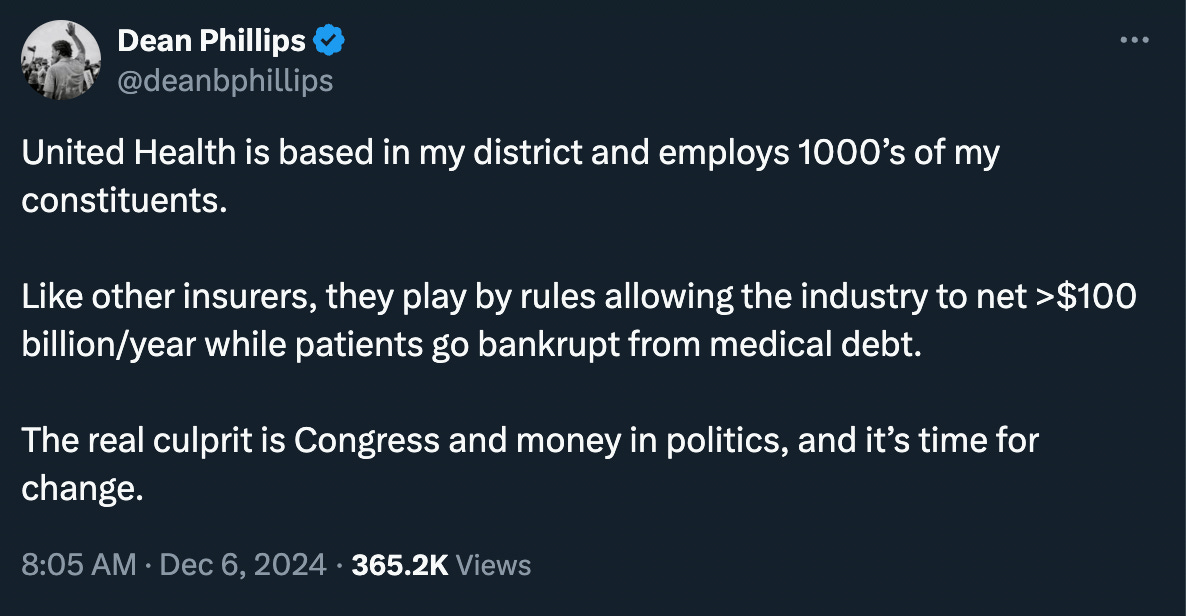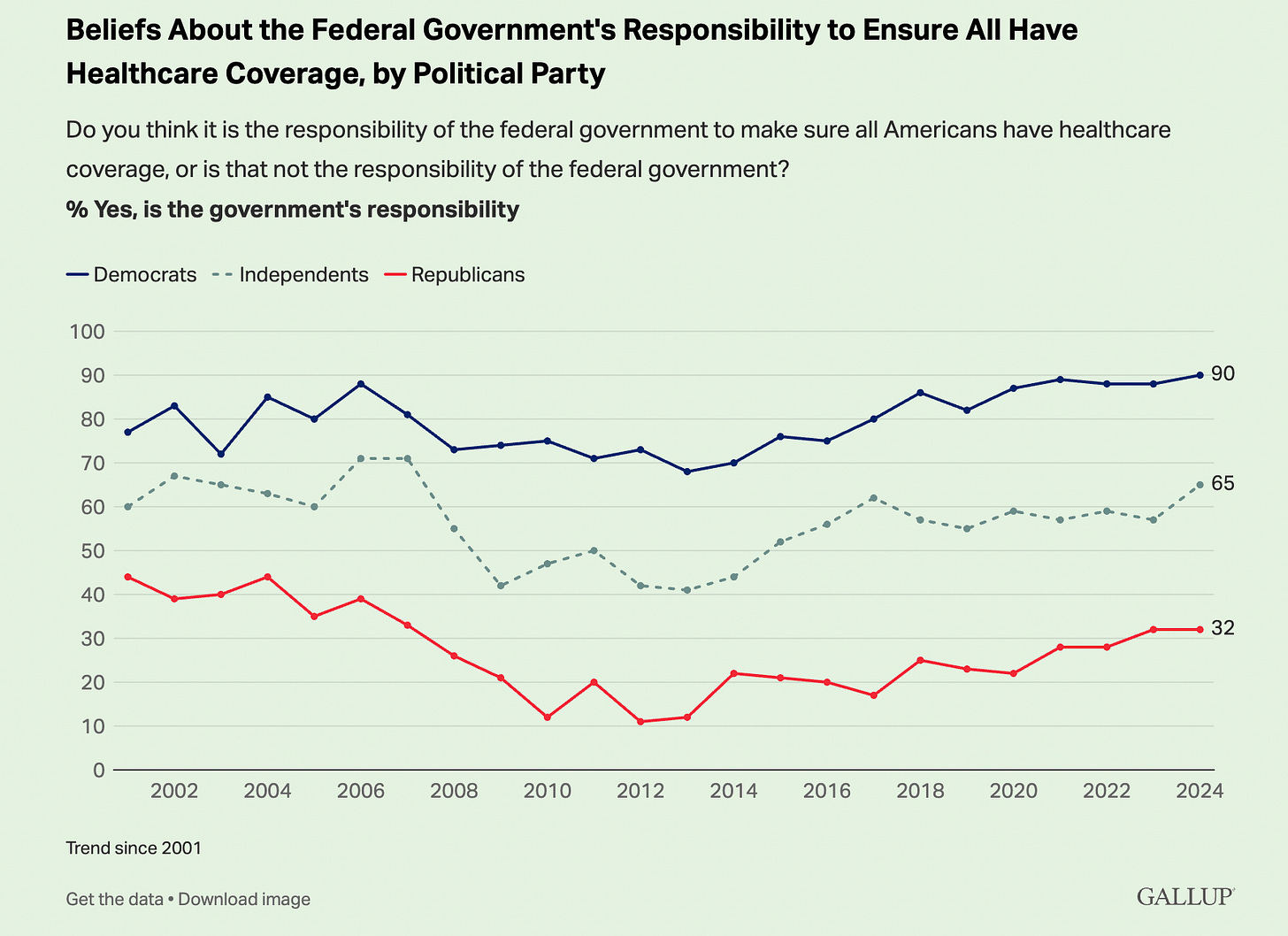Five Thoughts About the Response to the UnitedHealthcare CEO's Assassination
Pressure politicians instead of celebrating violence.
The shocking assassination of UnitedHealthcare CEO Brian Thompson has resulted in some equally shocking — though entirely unsurprising — debates online. As someone who has long engaged in the health care discourse, I’d like to offer a few thoughts about the reaction.
First, it’s unacceptable to lionize an assassin. Violence is not how political or social change should be accomplished in a democracy. The vocal praise for alleged killer Luigi Mangione from some social media users is grotesque and deranged. Brian Thompson was a father with children.
Second, while it’s understandable that some Americans — many of which have been traumatized by the insurance industry’s maddening business practices — are responding to the assassination by lashing out at United Healthcare and insurers, it’s important to remember that politicians elected by U.S. citizens set the perverse rules of the health care game, which consumes nearly 20% of our GDP. I’ve supported universal health care my entire adult life and believe the corporate health insurers need to be severely regulated — like in the Netherlands or Germany — or (ideally) replaced by a single-payer national insurance program, but the path to that happening goes through pressuring politicians rather than harassing insurance company employees on the phone or encouraging violence against them.

Third, politicians — especially Democrats who claim to believe health care is a right — should be listening to the nightmare anecdotes that many Americans are sharing right now. It was infuriating to me that the DNC removed universal health care from their platform during the summer, and that Kamala Harris abandoned her past support for the policy. There’s vile language celebrating death right now, but also people reacting to the outsized coverage of the insurance industry in the media by sharing their own pain with coverage denials, bureaucracy, and outrageous medical bills. Donald Trump won, in part, because of immense public anger over the cost-of-living crisis and the perception that Democrats are the party of corporate elites and corruption — and it’s difficult to think of an industry that contributes more to financial insecurity among Americans than private health insurance corporations with their $10,000 deductible plans.
Fourth, addressing public anger over health care is an opportunity for bipartisan cooperation. Political violence is a sign of a sick, divided society and (responsible) elected officials have an obligation to work together to advance policies that will promote peace and well-being. Alongside 90% of Democrats and 65% of independents who believe it’s the federal government’s responsibility to guarantee universal health insurance coverage, the percentage of Republicans who feel the same has risen from 11% in 2012 to 32% in 2024. In the past, Donald Trump has praised Scotland’s socialized health service and Australia’s single-payer system — is he a maverick Republican on health care that Democrats could work with to expand coverage and reduce costs? This strikes me as possible, especially given the importance of working-class voters to his political coalition.

Fifth, everyone would benefit from using more dispassionate, specific, and sober language about U.S. health care and its structural problems moving forward — for example, Elizabeth Warren’s comment was inappropriate. One of the biggest problems with the insurance industry, as Matt Bruenig recently argued, is their refusal to acknowledge their own responsibility for the outrageous cost of U.S. health care:
This is not to absolve drug companies and providers for taking advantage of the private insurance system (and the patent system) to line their pockets with rents. That is bad too. But keeping these rents in check is literally what we pay the insurance companies to do. That’s literally their job! It’s the job they are paid hundreds of billions of dollars a year to do, and they either cannot do it or refuse to do it all while using the money we are all forced to give them to resist any efforts to have the government do it.
Rather than malign insurance company executives as “murderers” or “blood-suckers” — with the potential to trigger violence in a country where guns and knives are accessible to everyone — advocates, writers, and politicians seriously interested in addressing our health care crisis should describe the insurers as “incompetent,” “ineffective,” or “failures.” The latter correctly highlights their inability to control costs and focuses on the systemic shortcomings that can be fixed with political action, such as all-payer rate setting (i.e. price controls) or replacing the insurers with a powerful single-payer system capable of pushing costs down. Words are not violent, but they can unleash violence.



I have quoted you here: https://willshetterly.substack.com/p/what-you-say-about-luigi-mangione
I like your third and fourth paragraphs and completely agree the Democrats blew this one badly. But I think you fail to understand what King called the language of the unheard.